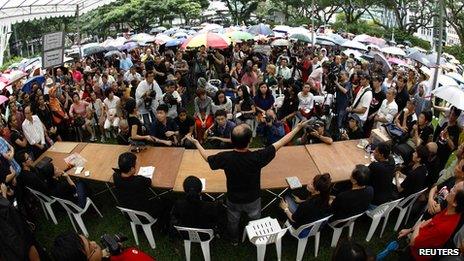Rare mass rally over Singapore immigration plans
- Published

Critics of the government's white paper say they want to see a curb on the numbers of immigrants
Singaporeans have staged a rare demonstration, in protest at government plans to allow more immigration.
Organisers said more than 4,000 people attended the rally, making it one of Singapore's largest ever protests.
They are angry at a recent government policy paper that predicted the population would grow by 30% to 6.9 million by 2030, with immigrants making up nearly half that figure.
Many locals blame immigration for rises in property prices and living costs.
The peaceful three-hour rally took place in heavy rain at a park venue known as Speakers' Corner, where protests are allowed without a police permit. Only a handful of uniformed officers were seen close by,
The crowds, protected from the downpours by a sea of umbrellas, came out to voice their displeasure at the ruling People's Action Party's (PAP) immigration policies, rally organisers said.
"The large crowd here shows the PAP government that they are not afraid any more, they don't want to hide behind a moniker on Facebook to show their displeasure," chief organiser Gilbert Goh, a former opposition candidate for parliament, told AFP news agency.
"They are showing their deep displeasure with the white paper."
Singapore is known for its strict social controls and intolerance of dissent.
Saturday's protest came as news emerged that Singapore's first prime minister, 89-year-old Lee Kuan Yew, has been taken to hospital with a brain-related blockage.
Mr Lee, who is the father of current Prime Minister Lee Hsien Loong, will remain in hospital while he recovers from a suspected transient ischaemic attack, which occurs when blood flow to the brain stops for a period of time, a statement from his son's office said.
Falling birth rate
The Singaporean government said last month that it expected its population to increase by 30% to between 6.5 million and 6.9 million by 2030, with foreigners making up 45% of that number.
It said immigration was needed to help offset a slowing birth rate and ageing population, and it needed to find a balance between the number of Singaporeans and foreigners in order to sustain its rate of economic growth.
"If we do too little to address the demographic challenge, we risk becoming a steadily greying society, losing vitality and verve, with our young people leaving for opportunities elsewhere," it said in the white paper, external.
"But if we take in too many immigrants and foreign workers, we will weaken our national identity and sense of belonging, and feel crowded out of our own home."
Singapore's total fertility rate of 1.2, which represents the number of children that would be born to a woman if she were to live to the end of her child-bearing years, has been below the population replacement rate for more than three decades.
That has led to concerns that the number of Singaporeans may shrink in the coming years.
But many local people say the surge in foreigners in recent years has already put a strain on the small, wealthy island state's resources, and has pushed down salaries while raising property prices.
- Published30 November 2012
- Published30 January 2013
- Published23 January 2013
- Published22 January 2013
- Published14 January 2013